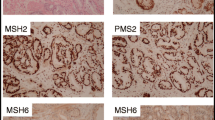Abstract
Lynch Syndrome is an autosomal dominant condition characterized by early onset colorectal cancer (CRC) and is associated with cancers of the gastrointestinal and reproductive tracts. Germline mutations in DNA mismatch repair (MMR) genes have been causally associated with cancers of Lynch Syndrome. We investigated the occurrence of prostate cancer (PCa) in families with a history of colorectal cancer to assess prostate cancer as a feature of the Lynch Syndrome spectrum. Family pedigrees containing at least one CRC case as well as those meeting guidelines for Lynch Syndrome were identified and tumors were requested from participants who underwent radical prostatectomy (RP). Selected families were analyzed for association with type of PCa and clinical characteristics of aggressive disease. Microsatellite Instability (MSI) analysis was preformed on available tumors and correlated to loss of expression in MMR genes by immunohistochemical (IHC) staining. 95 individuals were identified as members of potential Lynch Syndrome families who underwent RP and 35 tumors from 31 families were received for MSI analysis. Two tumors from two unrelated families with known MMR mutations were MSI-high and one additional case from a third family was MSI-low. The remainder of the prostate cancer cases demonstrated no evidence of MSI. PCa incidence in families enriched for hereditary PCa with a history of Lynch Syndrome cancers is not strongly suggestive of the presence of an MMR mutation. However prostate tumors in known MMR mutation carriers did display MSI and loss of gene expression suggesting that PCa may arise in Lynch Syndrome due to defective DNA mismatch repair.



Similar content being viewed by others
References
Jemal A, Siegel R, Xu J, Ward E (2010) Cancer statistics, 2010. CA Cancer J Clin (epub ahead of print)
Schaid DJ (2004) The complex genetic epidemiology of prostate cancer. Hum Mol Genet 13(Spec No 1):R103–R121
Stoffel E, Mukherjee B, Raymond VM, Tayob N, Kastrinos F, Sparr J et al (2009) Calculation of risk of colorectal and endometrial cancer among patients with Lynch syndrome. Gastroenterology 137(5):1621–1627
Lynch HT, Lynch PM, Lanspa SJ, Snyder CL, Lynch JF, Boland CR (2009) Review of the Lynch syndrome: history, molecular genetics, screening, differential diagnosis, and medicolegal ramifications. Clin Genet 76(1):1–18
Watson P, Riley B (2005) The tumor spectrum in the Lynch syndrome. Fam Cancer 4(3):245–248
Kastrinos F, Mukherjee B, Tayob N, Wang F, Sparr J, Raymond VM et al (2009) Risk of pancreatic cancer in families with Lynch syndrome. JAMA 302(16):1790–1795
Soravia C, van der Klift H, Brundler M-A, Blouin J-L, Wijnen J, Hutter P, Fodde R, Delozier-Blanchet C (2003) Prostate cancer is part of the hereditary non-polyposis colorectal cancer (HNPCC) tumor spectrum. Am J Med Genet 121A(2):159–162
Peltomaki P, Vasen H (2004) Mutations associated with HNPCC predisposition—Update of ICG-HNPCC/INSiGHT mutation database. Dis Markers 20(4–5):269–276
Vasen HF, Mecklin JP, Khan PM, Lynch HT (1991) The international collaborative group on hereditary non-polyposis colorectal cancer (ICG-HNPCC). Dis Colon Rectum 34(5):424–425
Vasen HF, Watson P, Mecklin JP, Lynch HT (1999) New clinical criteria for hereditary nonpolyposis colorectal cancer (HNPCC, Lynch syndrome) proposed by the International Collaborative group on HNPCC. Gastroenterology 116(6):1453–1456
Umar A, Boland CR, Terdiman JP, Syngal S, de la Chapelle A, Ruschoff J, Fishel R, Lindor NM, Brugart LJ, Hamelin R, Hamilton SR, Hiatt RA, Jass J, Lindblom A, Lynch HT, Peltomake P, Ramsey SD, Rodriguez-Bigas MA, Vasen HFA, Hawk ET, Carl Barrett J, Freedman AN, Srivastava S (2004) Revised Bethesda Guidelines for hereditary nonpolyposis colorectal cancer (Lynch syndrome) and microsatellite instability. J Natl Cancer Inst 96(4):261–268
Cunningham JM, Shan A, Wick MJ, McDonnell SK, Schaid DJ, Tester DJ et al (1996) Allelic imbalance and microsatellite instability in prostatic adenocarcinoma. Cancer Res 56:4475–4482
Uchida T, Wada C, Wang C, Ishida H, Egawa S, Yokoyama E et al (1995) Microsatellite instability in prostate cancer. Oncogene 10(5):1019–1022
Chen Y, Wang J, Fraig MM, Metcalf J, Turner WR, Bissada NK et al (2001) Defects of DNA mismatch repair in human prostate cancer. Cancer Res 61(10):4112–4121
Ahman AK, Jonsson BA, Damber JE, Bergh A, Gronberg H (2001) Low frequency of microsatellite instability in hereditary prostate cancer. BJU Int 87(4):334–338
Grindedal EM, Moller P, Eeles R, Stormorken AT, Bowitz-Lothe IM, Landro SM et al (2009) Germ-line mutations in mismatch repair genes associated with prostate cancer. Cancer Epidemiol Biomarkers Prev 18(9):2460–2467
Acknowledgments
Supported by a grant from the Donald and Jo Anne Petersen Endowed Research Fund of the University of Michigan Comprehensive Cancer Center. The University of Michigan Prostate Cancer Genetics Project (PCGP) is supported by the National Cancer Institute R01 CA79596 (K.A. Cooney). Funds were also provided from University of Michigan School of Public Health and the Public Health Genetics Interdepartmental Concentration Internship program. We thank all PCGP men and their families who generously volunteered their time to participate in our study. We also gratefully acknowledge Dr. Stephen N. Thibodeauau for his assistance with tumor staining and genetic testing of Patient 29 and Dr. Kirk Wojno for his assistance with pathology specimens.
Author information
Authors and Affiliations
Corresponding author
Rights and permissions
About this article
Cite this article
Bauer, C.M., Ray, A.M., Halstead-Nussloch, B.A. et al. Hereditary prostate cancer as a feature of Lynch Syndrome. Familial Cancer 10, 37–42 (2011). https://doi.org/10.1007/s10689-010-9388-8
Published:
Issue Date:
DOI: https://doi.org/10.1007/s10689-010-9388-8




